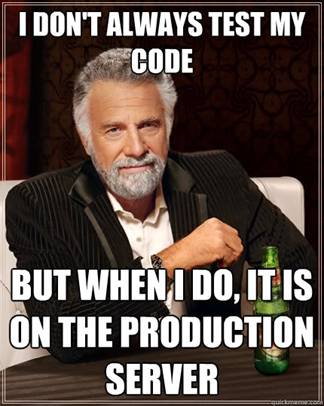just when you think you know, you don't
masen, 01 May 2012
 As the natural-born overachieving perfection-seeking pragmatist that I am,
I often find myself exceeding the specifications on my Computer Science
assignments. Generally, I find them to be either too simple, or not
interesting; and in an effort to 'get the education my parents paid
for' I make my own rules.
As the natural-born overachieving perfection-seeking pragmatist that I am,
I often find myself exceeding the specifications on my Computer Science
assignments. Generally, I find them to be either too simple, or not
interesting; and in an effort to 'get the education my parents paid
for' I make my own rules.
Unfortunately, in UNIX software development, part of the specification is to explicitly NOT stray from the specification…and the assignments are too easy. How could I remain an overachieving bastard while not sacrificing my turn-in grades by modifying the assignment?
100% code coverage? That may just be crazy enough to enlighten me. I've been reading/hearing about TDD (test driven development) and the benefits of testing discrete pieces of code for expected behavior. It's fun and since I started, I've caught about 3 or 4 bugs which previously slipped through my professor's grading script. There's plenty of material on it around the internet, and that's not what this entry is quite about.
The ongoing assignment for the quarter is to implement our own basic mini shell, msh. Part of the current assignment this week is to implement shell scripting. Ahh, I can't wait to test this, I thought…
The mini shell is written in C, however I'm using Python's subprocess and unittest modules for running 'External' tests: I Popen my shell and send data to it. For the scripting test, I open a file, __test_script.msh; write the contents of the test script (stored as literal strings in the python code); and then execute the shell with __test_script.msh as the argument. Straightforward right:
class TestMshExternal(unittest.TestCase):
def setUp(self):
self.EXE = ["./msh"]
def executeLine(self,inp,env,EXE=None):
if EXE is None:
EXE = self.EXE
msh = Popen(EXE,stdin=PIPE, stdout=PIPE, stderr=PIPE, env=env)
raw_output, raw_err = msh.communicate(inp)
return (raw_output, raw_err, msh.returncode)
def test_a4_execute_script(self):
f = open("__test_script.msh","w")
f.write("""
echo showshift is named $0
echo Number of arguments is $#.
echo Argument 1 is $1.
echo Argument 2 is $2.
echo Argument 3 is $3.
echo Argument 4 is $4.
shift 3
echo Number of arguments is $#.
echo Argument 1 is $1.
echo Argument 2 is $2.
echo Argument 3 is $3.
echo Argument 4 is $4.
unshift 1
echo Number of arguments is $#.
echo Argument 1 is $1.
unshift
echo Number of arguments is $#.
echo Argument 1 is $1.
""")
args1 = ["./msh","__test_script.msh","a","b"]
result = self.executeLine("", None, args1)
# make assertions about the result
So I run it and…no output. The result tuple, which should return the strings from the stdout and stderr buffers as well as the return code, contained empty strings. I looked at the script file:
furerm@CF416-11:~/code/csci352/work/msh$ cat __test_script.msh
echo showshift is named $0
echo Number of arguments is $#.
echo Argument 1 is $1.
echo Argument 2 is $2.
echo Argument 3 is $3.
echo Argument 4 is $4.
shift 3
echo Number of arguments is $#.
echo Argument 1 is $1.
echo Argument 2 is $2.
echo Argument 3 is $3.
echo Argument 4 is $4.
unshift 1
echo Number of arguments is $#.
echo Argument 1 is $1.
unshift
echo Number of arguments is $#.
echo Argument 1 is $1.
Everything looks good… I separated out the Popen code from the main test script and ran it in iPython: the result came back just as expected! I tried it again as part of the test script: Nothing. I run it from the shell, works as expected. At this point, I've brought in some cronies to help me debug this overachieving mess to no avail. Searching on the internet turns up nothing and my pragmatic side starts to take over: "Dude, you've been working on this unnecessary thing (which technically works) for over 2.5 hours now, it's not worth your time!" You're right, self, so I tabled the script and finished the actual assignment.
After completion, I was still unsettled that my test script was borked. Determined to solve the problem for my own sanity, I decided to start dismantling this part of the test case piece by piece. (My previous solution strategy was to make a conjecture, try it, repeat). I moved all the shell spawning Popen stuff into the test function itself to isolate it and began simplifying the script. The next thing I removed was the actual writing of the __test_script.msh file (it already existed on the filesystem anyway). As I selected the last line in Vim Visual Line mode I had the realization of my ignorance…
I never closed the file 0.o
The script interpreter stops execution on EOF…and it never found one. All in all, I had sunk about 4 or 5 hours into such folly which needs only a two line fix. (I likely made this error because of my overuse of contextmanagers =])
furerm@CF416-11:~/code/csci352/work/msh$ diff test.py test_fix.py
232,233c232,233
< f = open("__test_script.msh","w")
< f.write("""
---
> with open("__test_script.msh","w") as f:
> f.write("""
I feel like I speak out about this sort of ignorant debugging frequently in the form of advice: "Read what the code is doing, not what it *should* be doing". In all the tinkering, I had erroneously assumed that years of programming experiencing would compel someone to close an open file after writing it, or at least before executing it with an external child process…eeps.
Just when you think you know how to program, you don't… It's as true in programming as it is in life: when you assume, you make an ass-(out of)-u-(and)-me.